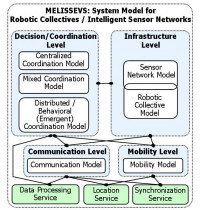Research Projects

MELISSEVS: Development and Analysis of an Integrated Model for Representation of Collaborative Robotic and Intelligent Sensor Systems in Environment Exploration and Supervision Applications
The project approaches a multi-disciplinary thematic area, covering high-priority fields of fundamental and applicative research: environment quality and security, collaborative robotic environments, intelligent sensor networks, emergent behavior, mathematical modeling and formalization.
The goal of the project is the development and analysis of an integrated model for representation of collaborative robotic and intelligent sensor systems, MELISSEVS, for the implementation of environment exploration and supervision applications with direct impact on the modern information-based society, the introduction of high-end technologies in the industry and in every-day life, as well as for the protection of the environment. The main objectives of the project focus on the study and implementation of the following aspects: the definition, integration and validation of a coherent set of models for the formalization of collaborative behavior patterns, of the infrastructure, the provided services and the interactions within robotic collective and intelligent sensor systems, as well as on the evaluation of the entire modeling system in the context of a set of applications for exploration, supervision and operation in various types of environment.
The project resources include a research team with rich theoretical and practical experience in the field (2 PhD. staff and 3 PhD. students), as well as an inter-disciplinary research and development network, RTE-DSP, composed of 4 well-equipped laboratories. The project results will consist of the integrated modeling system MELISSEVS to provide an ideal framework for the development and analysis of complex applications involving collaborative-type distributed intelligence, perception and operation, as well as of a number of complete methodologies, studies and applications in the field, the successful finalization of the PhD. program for 3 team members, and an important number of highest-level scientific publications.


